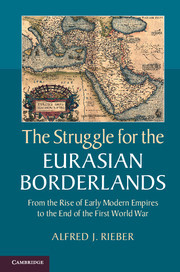The Struggle for the Eurasian Borderlands From the Rise of Early Modern Empires to the End of the First World War
Langue : Anglais
Auteur : Rieber Alfred J.

A major new account of the Eurasian borderlands as 'shatter zones' which have generated some of the world's most significant conflicts.
This book explores the Eurasian borderlands as contested 'shatter zones' which have generated some of the world's most significant conflicts. Analyzing the struggles of Habsburg, Russian, Ottoman, Iranian and Qing empires, Alfred J. Rieber surveys the period from the rise of the great multicultural, conquest empires in the late medieval/early modern period to their collapse in the early twentieth century. He charts how these empires expanded along moving, military frontiers, competing with one another in war, diplomacy and cultural practices, while the subjugated peoples of the borderlands strove to maintain their cultures and to defend their autonomy. The gradual and fragmentary adaptation of Western constitutional ideas, military reforms, cultural practices and economic penetration began to undermine these ruling ideologies and institutions, leading to the collapse of all five empires in revolution and war within little more than a decade between 1911 and 1923.
Introduction; 1. Imperial space; 2. Imperial ideologies: cultural practices; 3. Imperial institutions: armies, bureaucracies and elites; 4. Imperial frontier encounters; 5. Imperial crises; 6. Imperial legacies; Conclusion: transition.
After thirty years as Professor of History and Chair for ten years at the University of Pennsylvania, Alfred J. Rieber went to Budapest in 1995 to chair and reorganise the History Department at the Central European University. Since then he has taught hundreds of students from the Eurasian borderlands. His first visit to the Soviet Union came in January 1956 followed by his participation in the first year of the cultural exchange at Moscow State University (1958–9). Over the past fifty years, he has continued his scholarly visits and travels throughout Eurasia, going as far east as the Buryat Mongol Republic. His publications include works on Soviet foreign policy, Russian social history and the comparative history of frontiers. His American and European doctoral students have published widely in the history of the Eurasian borderlands. Professor Rieber's work on frontiers has been translated into Russian, Polish and Ukrainian and he has won two teaching awards in the USA and two in Hungary, as well as a Prize from the American Philosophical Society. His scholarship has been supported by fellowships from the Ford Foundation, the Guggenheim Foundation, the National Council for Soviet and East European Studies, National Endowment for the Humanities, St Antony's College, Oxford and the Inter-University Committee on Travel Grants.
Date de parution : 03-2014
Ouvrage de 648 p.
15.2x22.8 cm
Date de parution : 03-2014
Ouvrage de 652 p.
15.2x22.9 cm
Disponible chez l'éditeur (délai d'approvisionnement : 14 jours).
Prix indicatif 106,56 €
Ajouter au panierThème de The Struggle for the Eurasian Borderlands :
© 2024 LAVOISIER S.A.S.



